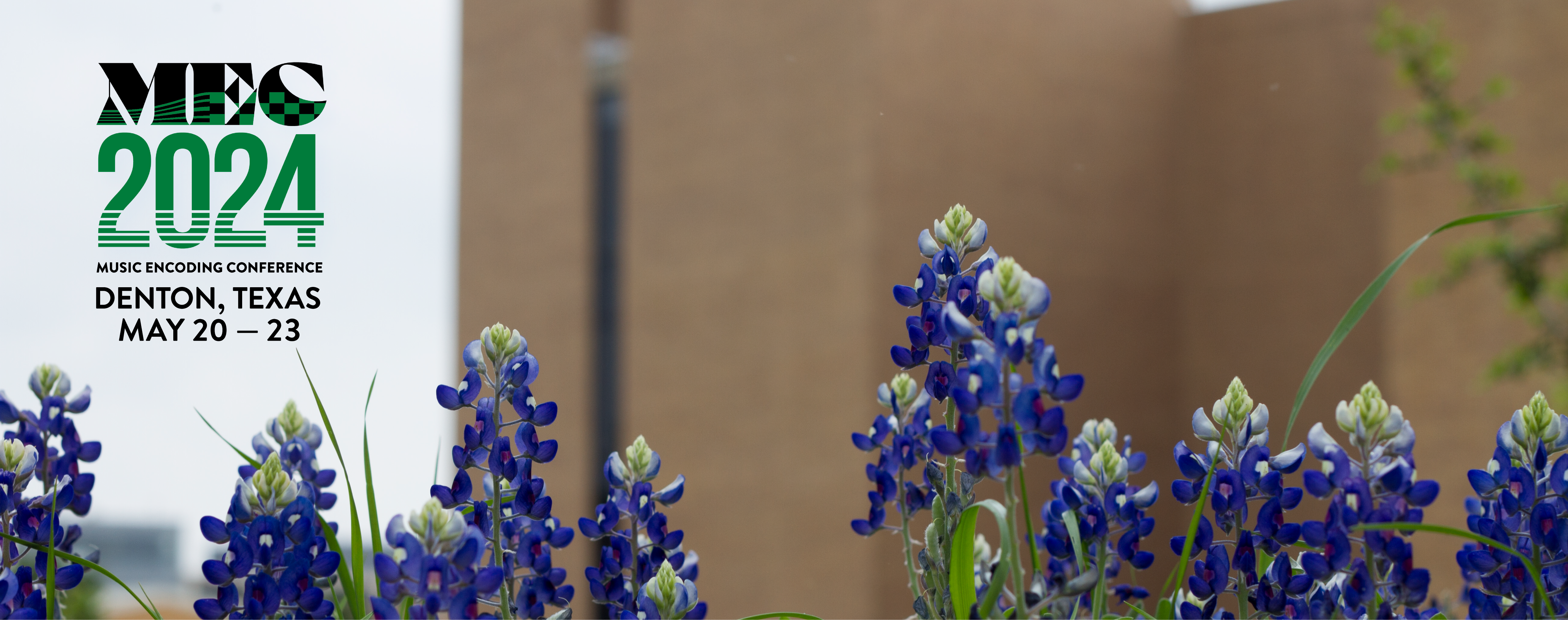
Participants may join each session in-person or online, except where noted otherwise. Times are given in local conference time (CDT). Full session details, including Zoom links will be available in Conftool, https://www.conftool.net/mec2024/
Program Overview:| May 20, 2024: Workshops |
| May 21, 2024: Conference Day 1 |
| May 22, 2024: Conference Day 2 |
| May 23, 2024: Unconference Day |
Conveners: Samantha J. Turner and Trent J. Wintermeier, University of Texas, Austin
Created by Dr. Tanya Clement and Brumfield Labs, AVAnnotate is a free and open source workflow and application for sharing annotations of audio and video artifacts and making digital exhibits and editions with AV materials. Leveraging IIIF and GitHub for sharing curated annotations of audiovisual materials held at libraries, archives, and museums, AVAnnotate allows users to combine metadata for online audio and video assets with user-generated annotations and contextual essays to create simple web-based editions and exhibits. Learn more about AudiAnnotate.
Convener: Maristella Feustle, University of North Texas
This workshop will proceed similarly to that of the previous three years, and is intended to give absolute beginners extended explanations of and practice with XML basics and rudimentary MEI encoding. The content will include, but not be limited to that of the MEI online tutorials, in order to maximize comprehension and retention of information through repetition and the gradual addition of new information in successive exercises.
Convener: Maristella Feustle, University of North Texas
This workshop has been moved to Tuesday, May 21 from 3:00-5:30PM. Workshop details can be found there.
Presenter(s): Joshua Stutter, University of Sheffield, United Kingdom
Presenter(s): Elsa De Luca, Martha E. Thomae, Vicente Urones Sánchez, NOVA University of Lisbon, Portugal
Presenter(s): Jesse P. Karlsberg, Emory University
Presenter(s): Laurent Pugin1, Johannes Hentschel2, Ioannis Rammos2, Andrew Hankinson1, Martin Rohrmeier2
1:RISM Digital Center, Switzerland; 2: Digital and Cognitive Musicology Lab, EPFL, Switzerland
Presenter(s): Jacob Ivan Stevenson, David Day, Brigham Young University, United States of America
Presenter(s): Matthias Richter1, Boris Voigt2
1: SLUB Dresden; 2: University of Heidelberg
Presenter(s): Nikolaos Beer1, Alexander Nguyen2
1: University of Paderborn, Germany; 2: Max-Reger-Institute, Karlsruhe/Germany
Convener: Clemens Gubsch, Austrian Academy of Sciences
The comprehensive and standardized gathering of metadata within MEI plays a crucial role in various application scenarios, serving as a key factor in rendering research data in an easily searchable, reusable, and archivable way. Whether applied to music editions or work catalogues, essential and specific meta-information related to composers, works, and performances is consistently collected and subsequently presented online for users. This collaborative workshop aims to equip participants with fundamental understanding of metadata encoding in MEI. Theoretical concepts, including the use of FRBR and the incorporation of standard data, are elucidated, along with an exploration of the diverse components within the MEI header. Data entry will be evaluated across various application scenarios, focusing on selected works and manuscripts: In a first step, the participants should encode the given metadata manually. Different input editors are employed to provide users with insight into available applications and help them determine the one that best suits their project-specific requirements. The three applications are:
The possibilities for entering MEI metadata – all the information that can be stored in can become very unmanageable, especially for beginners. All three editors are used both to create metadata for already existing music encodings and to structure and manage more extensive data sets such as work catalogues, sources and performances as uniformly as possible. All input masks have their advantages and disadvantages, but nevertheless generate more structured data than is possible with manual encoding.
Presenter(s): Johannes Kepper, Lisa Rosendahl, Richard Sänger, Beethovens Werkstatt, Germany
Presenter(s): Sarah J. Monnier, James K. Tauber
Presenter(s): Joshua Neumann, Kristina Richts-Matthaei, Academy of Sciences and Literature, Mainz, Germany
Presenter(s): Markus Lepper1, Baltasar Trancón y Widemann1,2
1:semantics gGmbH, Germany; 2: Hochschule Brandenburg
Presenter(s): Shintaro Seki, The University of Toyko, Japan
Presenter(s): Kyrie Ekaterina Bouressa, Ichiro Fujinaga, McGill University, Canada
Presenter(s): Patricia García-Iasci1, 2, Juan Carlos Martínez Sevilla1, David Rizo1, 3, Jorge Calvo-Zaragoza1
1: University of Salamanca, Spain; 2: University of Alicante, Spain; 3: ISEA.CV
Michael Scott Asato Cuthbert researches computational and algorithmic approaches to understanding music. He has received a Radcliffe Fellowship, the Rome Prize in Medieval Studies, and a Harvard Villa I Tatti Fellowship. Cuthbert created the open-source music21 toolkit and founded the Digital Humanities Lab at MIT where he is also Associate Professor. He is co-founder and Chief Musical Officer of Artusi, Inc.
Digital Pedagogy IG, MerMEId, Multilingual Tutorial Working Group